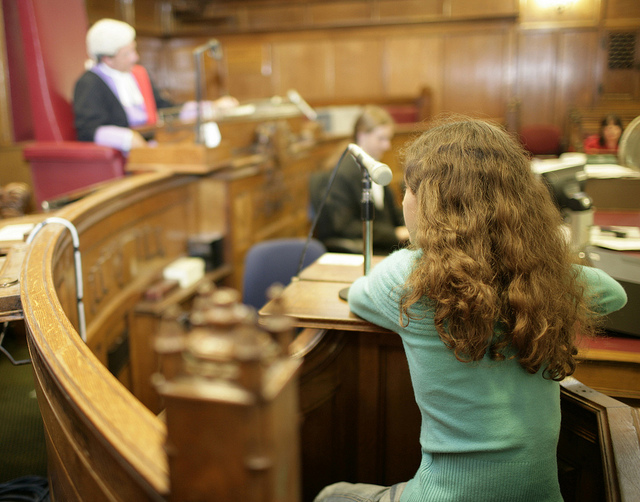
Dishonesty and Theft: Time for Change?
September 7, 2013
Scholarships: How to Apply and Succeed
September 26, 2013There are a vast number of pro bono opportunities for law students seeking to improve their skill set and elevate their employment prospects, the most accessible of which are found within university societies. However, there are also opportunities outside of university societies, one such activity is volunteering with Victim Support. This article will focus on the Witness Service branch of this charity.
An overview
Many witnesses have no experience of court, with some relying on what they have seen on television…
Simply put, the Witness Service’s aim is to guide witnesses through the legal process of giving evidence whilst offering support to enable them to do so comfortably. Many witnesses have no experience of court, with some relying on what they have seen on television as a source of information. As a result, a considerable number are fearful of being cross-examined and of appearing in court. Understandably, some witnesses are therefore reluctant about coming to court. Without the Witness Service, prosecution witnesses would be resigned to linger around the foyer of the building until being called upon by the Usher, having received no information or guidance. Moreover, often in the Magistrates’ courts the defendant will not be in custody; having direct contact with the defendant immediately before the trial would potentially be distressing for the prosecution witnesses.
The delivery of information begins even before the witness’s arrival at court. The witness care unit initiates contact and offers a pre-trial visit, where a witness has the opportunity to meet a volunteer and see the layout of the court.
Early contact allows identification of any specific needs that could affect a person’s ability to give evidence on the day. Special measures for vulnerable and intimidated witnesses, including screens and live video links which obscure the defendant from their view, can make the process a less intimidating one. Knowledge of certain medical conditions is especially important if it can be triggered or worsened by stress or anxiety. This allows the Witness Service to anticipate and prepare for support on an individual basis.
What is the application process?
An online application is submitted, followed by an interview with a witness service manager. If successful – and after references and a CRB check – the applicant shadows existing volunteers and later commences a five day training course. Finally, after an observation of performance of the role, the person is accredited.
Becoming a qualified volunteer takes a few months with the limited availability of training dates, being the biggest issue. However, the process itself is not time consuming, and shadowing is very flexible. Furthermore, the charity is understanding of other commitments and strives to accommodate people. Qualified volunteers are asked to be available for one day a fortnight, although Victim Support understands that this may be difficult in extremely busy periods, such as the examination season.
Qualified volunteers are asked to be available for one day a fortnight…
What would I do as a volunteer?
Volunteers greet witnesses and their companions as they arrive at court. The aim of the service is then explained, along with its confidential nature and health and safety procedures.
Next, the whole process is explained, slowly and carefully, and in a manner suitable for the witness. Some examples include: the witness’s opportunity to read their statement, the roles of the different personnel found within the court, the court’s layout, the oath, the idea of proof beyond reasonable doubt, the cross-examination and the outcome of the trial.
Being approachable is…an essential.
An aspect underpinning the role is the offering of help in a way which can be declined, allowing support if it is asked for. Witnesses vary immensely with regards to the help and contact needed – being approachable is therefore an essential.
It is important to note at this point that in (almost) every trial the victim of the crime will give evidence. Consequently, an understanding of the types of emotions they may feel, their coming to terms with the incident, and of moving forward is an integral focus throughout the work.
What do I gain?
First, it is a position of significant responsibility. Volunteers are entrusted with the duty to inform and support witnesses – some of whom may be distressed – and in situations which can be challenging. As a result of this, the work helps to develop communication skills, especially through the demands to convey information to children, those with mental impairments and reluctant witnesses (those who have been summoned to attend court).
Second, the role necessitates professional conduct. Volunteers work under the direction of a manager, liaise with court Ushers, as well as having contact with the Crown Prosecution Service and barristers. Equally important is the fact that they represent the charity, and their behaviour affects the image portrayed to the public. Further, volunteers are entrusted with witness’s personal information which can include medical history. Data protection and the ethos underpinning the organisation requires this confidential information to be handled seriously.
Employers are increasingly interested in seeing time management skills in prospective candidates. Volunteering for the Witness Service, along with academic study or work and other extracurricular activities, often means concurrent deadlines and advances a person’s ability to prioritise work, as well as testifying a commitment to the legal industry.
The work can also involve diffusing difficult situations.
The work can also involve diffusing difficult situations. Frequently, cases are adjourned notwithstanding the number of hours witnesses may have been waiting; understandably they can be frustrated, confused and angry when told they must leave and return on a future date. Many mentally prepare themselves for the day and consequently this news is very unwelcome. The ability to empathise and explain the reasons for, and the result of, the decision to adjourn whilst emphasising that without witnesses a trial could not go ahead is imperative in calming emotions. Witnesses can feel unappreciated and abused by the court’s assumption of their time. Reiterating their value goes some way in ensuring they feel positive about their role and towards the legal system in general.
Lastly, such work also enhances the volunteer’s judgement. It must be identified at an early stage, the attention that need be apportioned, and to whom. Confident professionals on the one hand, for example, in comparison with vulnerable and intimidated people. While it is taught that volunteers must not act upon assumptions, common sense is requisite in the allocation of time to each witness.
In summation, the Witness Service affords an accessible platform from which volunteers can further their skills and demonstrate a commitment to a career in law, while providing a very valuable service to the public.
Alasdair Farrell is a final year student at the University of Nottingham and will be commencing the LPC after his degree.





